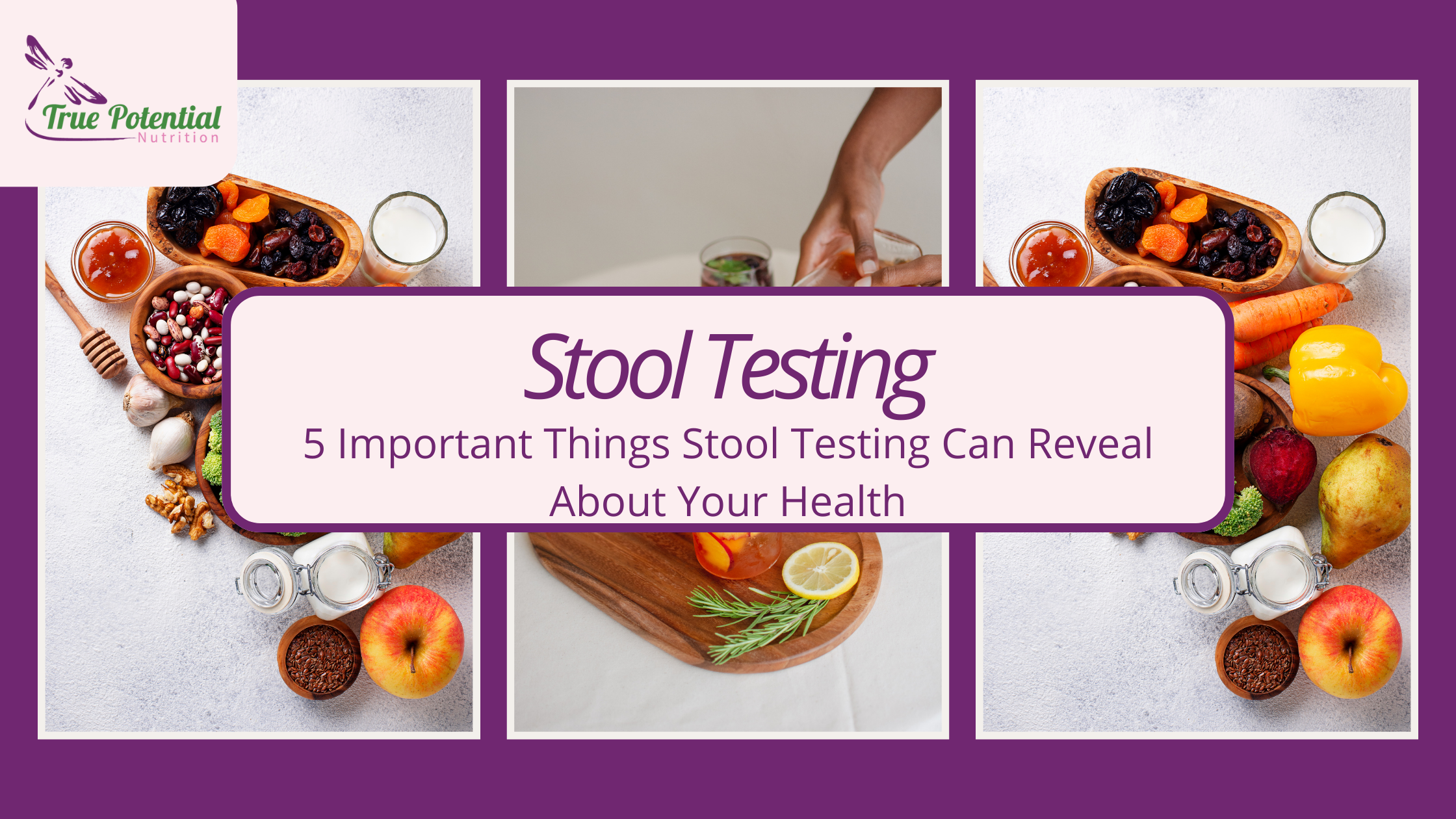By Danielle MacDowell M.S., CNS, LDN, M.Ed, BCBA, LABA

Main Takeaways
- When our digestive system is out of balance, it provides us with signs, such as malabsorption, maldigestion, heartburn, gas, bloating, nutrient deficiencies, and changes in bowel habits.
- Digestive troubles do not just remain in our gut, they extend to other areas of our health, including our mental, hormonal, immune and metabolic health.
- Stool testing can be used to assess for a broad spectrum of conditions, including gastrointestinal infections, inflammatory bowel disease, colon cancer, inflammation, dybiosis, malabsorption, maldigestion, and intestinal permeability.
- People with heartburn, gas, bloating, nutrient deficiencies, diarrhea, or constipation may want to consider a stool test.
- A stool test is a great tool to determine if you have maldigestion, malabsorption, dysbiosis, infection, GI inflammation, or intestinal permeability.
Table of Contents
An Unbalanced Digestive System….
When our digestive system is out of balance, it provides us with signs, such as:
- Malabsorption
- Maldigestion
- Heartburn
- Gas
- Bloating
- Nutrient deficiencies
- Changes in bowel habits
However, digestive troubles don’t just remain in our gut, they extend to other areas of our health, including our mental, hormonal, immune and metabolic health.
While many people have adopted many of these uncomfortable symptoms as their norm, these signs should be regarded as a signal that you digestive tract may need a reboot.
This is where a stool test can come in handy…..
What is a Stool Test?
As the name implies, a stool test is an assessment that involves analyzing a sample of a person’s stool. This allows the practitioner to identify signs of:
- Disease
- Inflammation
- Maldigestion
- Malabsorption
- Dysbiosis
- Infection
- Intestinal permeability
This type of testing can provide important information about the health of a person’s digestive system, as well as other aspects of their overall health. In the conventional medicine world, stool testing is typically used to diagnose gastrointestinal infections, inflammatory bowel disease, and colon cancer. In the functional medicine world, practitioners will use this tool for both diagnostic purposes and to look for aberrations in digestion, inflammation, bacterial abundance, intestinal permeability, and metabolism. Both types of practitioners also use stool testing to look for parasites, blood in the stool, and other abnormalities.
Curious about the process? A small sample of stool is collected and sent to a laboratory for analysis. Depending on the test, sometimes the stool sample is collected at home while other times it’s collected at the doctor’s office.
Who Should Get a Stool Test?
- Bloating & Gas
- Fatty Stools
- Heartburn
- Belching
- Diarrhea
- Feeling uncomfortably full after small meals
- Food particles in stools
- Persistent GI pain
5 Things a Stool Test Can Reveal About Your Health
1.) Maldigestion
Maldigestion is when the body in unable to properly break down food and extract the nutrients. This can happen when there are deficiencies in enzymes, stomach acid, or bile. It can also occur as a result of inflammation, gallstones, and other vairous health conditions.
Lifestyle can also impact digestion; For example, eating on the go or eating under stress can negatively impact your body’s ability to break down food.
A stool test is a great tool to determine if maldigestion is present. It can not only determine if the pancreas is functioning well enough to produce the enzymes the body needs to break down food, but it gets granular. A stool test can pinpoint how well the body is digesting fats and proteins.
Understanding your body’s ability to break down each macronutrient (carbs, fats, proteins) is important because each requires different digestive materials. For example, fat requires bile acids and lipases to be broken down and protein requires proteases and HcL to be broken down. So, honing in on where digestion is breaking down can be helpful in targeting an intervention.
Maldigestion Biomarkers
Comprehensive stool testing will often assess the following markers of maldigestion:
- Products of Protein
- Fecal Fats
- Pancreatic Elastase
If any of these biomarkers are abnormal, it likely means that you have maldigestion.
2.) Dysbiosis
There are about 100 trillion bacteria in our gut, [1] with approximately 300-500 different species! [2] Given these large numbers, I am sure that you can imagine that there is a delicate balance and interplay between these microbes in maintaining our health.
When this balance is disrupted, it is known as dysbiosis. Dysbiosis can result in gas, bloating, nausea, fullness, vomiting, and changes in bowel habits.
A comprehensive stool test will identify commensal and pathogenic bacteria abundance present in the gut. In other words, a stool test can determine the levels of good and bad bacteria in the gut.
3.) Infections
When it comes to the bacteria in the gut, not all are created equally. Some are health-promoting, while others are health-depleting and disease promoting. The health-depleting/disease-promoting bacteria are known as pathogens. One commonly known bacterial pathogen that wreaks havoc on the gut and one’s health is H.pylori.
H.pylori is extremely infectious. It has been estimated that this bacteria has infected anywhere from 50-75% of the world’s population. [3] What makes this bacteria particularly worrisome is that it is extremely contagious. And, to boot, the majority of people will not have symptoms.
H.pylori is just one type of pathogenic bacteria to keep an eye out for. However, pathogens are not exclusively in the bacteria family. Pathogens can also be parasites, viruses, and worms.
Signs and symptoms of possible gut infection include:
- Nausea
- Vomiting
- Fever
- Abdominal cramping and pain
- Diarrhea
- Bloody stool
If you are experiencing any of these symptoms, it is important to see a GI specialist to rule out a pathogenic infection.
4.) Inflammation
In small doses, inflammation provides our body with a “system of information flow” that can be used to address acute illness and injury. [4] This process allows the body to perform the essential functions needed for the body to recover, regenerate and heal, including:
- Fight infection
- Clear pathogens
- Remove cellular debris
- Rid the body of damaged tissue
When viewed from this vantage point, inflammation doesn’t seem so bad, right? And this is true…. “normal” inflammation is not the problem. The problem begins when our inflammatory processes become overburdened or inflammation lasts for too long. When either of these situations occurs, it can cause damage to our digestive system.
What Causes Inflammation in the Gut?
- Food allergies/sensitivities/intolerance
- Pathogens
- Inflammatory bowel diseases (IBD)
- Diet
- Lack of fermentable fiber
Inflammation in the gut can be assessed through stool testing by looking at 4 distinct markers:
- Secretory IgA
- Calprotectin
- Eosinophil Protein X
- Occult Blood
Inflammation can wreak havoc on all aspects of our health, including the digestive system. Food allergies, pathogens, inflammatory bowel disease, diet, and lack of fiber can all contribute to gut inflammation. Stool testing can help to detect if inflammation is present in your digestive tract.
5.) Intestinal Permeability (a.k.a. leaky gut)
Intestinal permeability is when the tight junctions in our gut lining is compromised, allowing things like undigested food particles to enter the bloodstream. This can have a whole host of damaging effects, like inflammation, food sensitivities and autoimmune activation, which is why it is crucial to keep this barrier intact.
There are several assessments that can be done to assess for intestinal permeability. But since we are discussing stool testing today, let’s begin with the stool tests that may be able to assess for leaky gut.
Stool Test for Leaky Gut:
- Zonulin
Zonulin a protein that helps regulate the tight junctions in our gut. Remember, these tight junctions are our body’s gatekeepers, preventing things like food particles and pathogens to enter into our blood stream.
High levels of zonulin in the stool have been linked to intestinal permeability. But, before placing all of our eggs in this one assessment basket, we need to consider zonulin’s antibodies. New research is showing that antibodies may be a better biomarker to assess for leaky gut. [5]
Additional Leaky Gut Tests
Although I am deviating a bit from the stool test convo, I think that it bears mentioning that there are additional tests that can be assessed if you suspect you have intestinal permeability. The following biomarkers are utilized from serum, urine or blood, respectively.
- Serum IgG (food sensitivity test)
- Lactulose-mannitol urine test
- Lipopolysaccharides (LPS)
- Zonulin antibodies
Intestinal permeability is when the tight junctions in our gut lining is compromised, allowing things like undigested food particles to enter the bloodstream. Zonulin, zonulin antibodies, food sensitivity tests, lactulose-mannitol urine test, and LPS assessments can help to determine if you have leaky gut.
Final Thoughts and Main Takeaways
A stool test is an assessment that involves analyzing a sample of a person’s stool. This allows the practitioner to identify signs of disease, inflammation, maldigestion, and infection. This type of testing can provide important information about the health of a person’s digestive system, as well as other aspects of their overall health. When symptoms are present, it is always important to get to the root cause, so interventions can be tailored to truly correcting the imbalance. If you have any signs of GI imbalance, a stool test may be just what you need to get to the bottom of what is going on with your health.
I am a functional nutritionist, specializing in gut health, mental health, hormonal health and neurodiversity. If you are looking for personalized nutrition recommendations or a functional testing, such as the one we discussed above, visit this link to set up a free discovery call to find out how I can help you reach your health and wellness goals.
- Can gut bacteria improve your health? Harvard Health Publishing. Updated September 18, 2023. Accessed on March 2, 2024. https://www.health.harvard.edu/staying-healthy/can-gut-bacteria-improve-your-health
- Quigley EM. Gut bacteria in health and disease. Gastroenterol Hepatol (N Y). 2013;9(9):560-569.
- Helicobacter pylori infection. University of California San Francisco. Updated on February 7, 2022. Accessed on March 2, 2024. https://www.ucsfhealth.org/medical-tests/helicobacter-pylori-infection
- Pizzorno J, Katzinger J. Clinical Pathophysiology: A Functional Perspective.
Coquitlam, British Columbia: Mind Publishing; 2012. - Vojdani A, Vojdani E, Kharrazian D. Fluctuation of zonulin levels in blood vs stability of antibodies. World J Gastroenterol. 2017;23(31):5669-5679. doi:10.3748/wjg.v23.i31.5669




